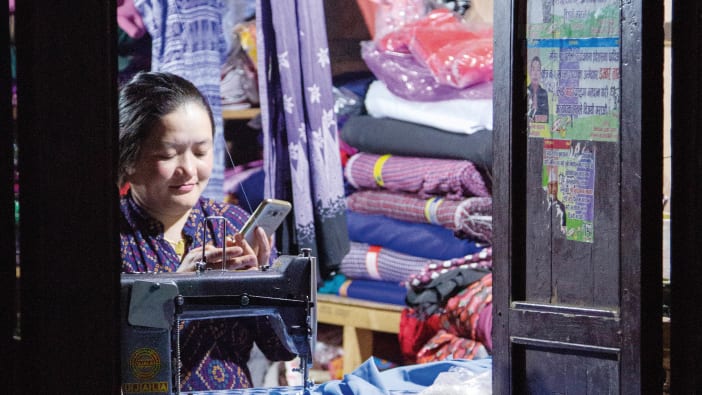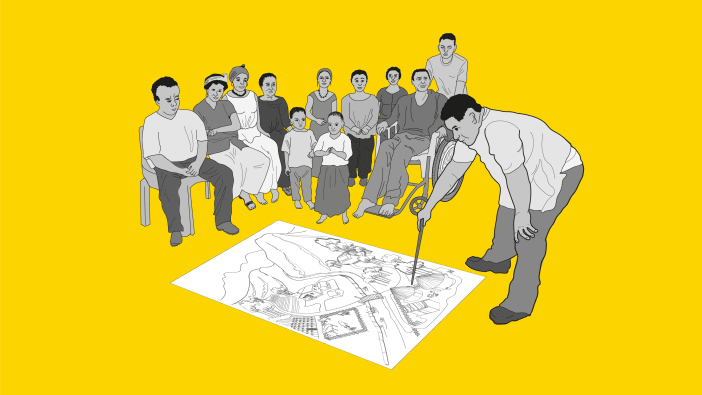It is very important that everyone has access to clear, trustworthy information about Covid-19 and how to reduce the spread of the disease, including vaccination options. People also need to know about any economic and social support that is available.
There are many ways that this information can be shared including radio, television, posters, leaflets and community meetings. Often the best approach will be to use a range of methods to ensure that everyone receives the information they need.
Be careful to consider:
- the best language(s) to use
- literacy levels - is verbal communication likely to be the best approach, or the use of images rather than words?
- the needs of people with disabilities
- the different needs of children, older people, men and women.
Often a participatory approach can work best where people are able to ask questions, discuss and share with each other the information that is most relevant for them.
For example, a radio show run by community members can provide opportunities for people to express and discuss their concerns, alongside clear, relevant information from trusted sources.
Hearing friends and other community members speaking on the radio can help to reduce feelings of isolation, confusion and panic in challenging situations, such as the Covid-19 pandemic.
Bolivia
Tearfund's partner OESER in Bolivia is using podcasts (audio recordings with interviews and discussion) to share information and stimulate conversations about issues caused by Covid-19 restrictions. The podcasts cover themes such as teenage pregnancy, wellbeing and healthy relationships.
Listeners say that this has been an excellent way to work with churches during the pandemic, and that the podcasts have led to many helpful conversations and discussions in their churches and communities.
Ethiopia
The Evangelical Churches Fellowship of Ethiopia has persuaded the government to allow church leaders to use national television channels to reach out to Ethiopians with prayer, worship services and Covid-19 prevention messages. This had previously been prohibited, so it is an historic collaboration between the religious leaders and the government.
As well as providing spiritual comfort, the use of television is allowing the church to influence the nation to respond positively to government rules established to help prevent the spread of the virus. The President has publicly supported the response of faith leaders to Covid-19, and communities across Ethiopia have responded well to their faith leaders' example.
Malawi
Local organisation Eagles is using radio broadcasts to share information about Covid-19. Towards the beginning of the pandemic they received a call from a community member who pointed out that people with sight loss had no access to any of the written information being shared by the government because it was not available in braille. Many were also unable to attend village meetings, so they were not receiving support such as hygiene supplies.
Eagles contacted local government officials who admitted that they had not considered the needs of people with sight loss when they were planning the response to Covid-19. Since then, Eagles has received government funding to produce leaflets in braille and is petitioning the government to provide more funding to organisations and district initiatives to support all vulnerable groups in rural communities.
Mozambique
The Christian Council of Mozambique realised that people who do not speak the official Portuguese language did not have access to information about Covid-19.
Senior church leaders approached government officials and asked them to start providing the information in local languages. The government responded positively and is now promoting a large prevention and awareness campaign using television and community radio in local and sign languages.
Yemen
Mariam, in Yemen, lives in a house without a toilet and has to travel for an hour each day to collect water. Her family all developed symptoms of Covid-19, but at the time she had no knowledge of the disease.
In community meetings, staff from Tearfund's local partner spoke about Covid-19 and made sure that everyone knew how to reduce its spread. They also provided hygiene kits including water filters and hand sanitiser.
'Now we understand the importance of physical distancing and drinking clean water,' says Mariam. 'It was great assistance that helped me and my family to be safe.' Mariam is setting up a mothers' group to continue to raise awareness in her community.









